Quick Links
Special Mentions
Written by Róisín Ryan-Flood
Ken Plummer Remembrance Conference
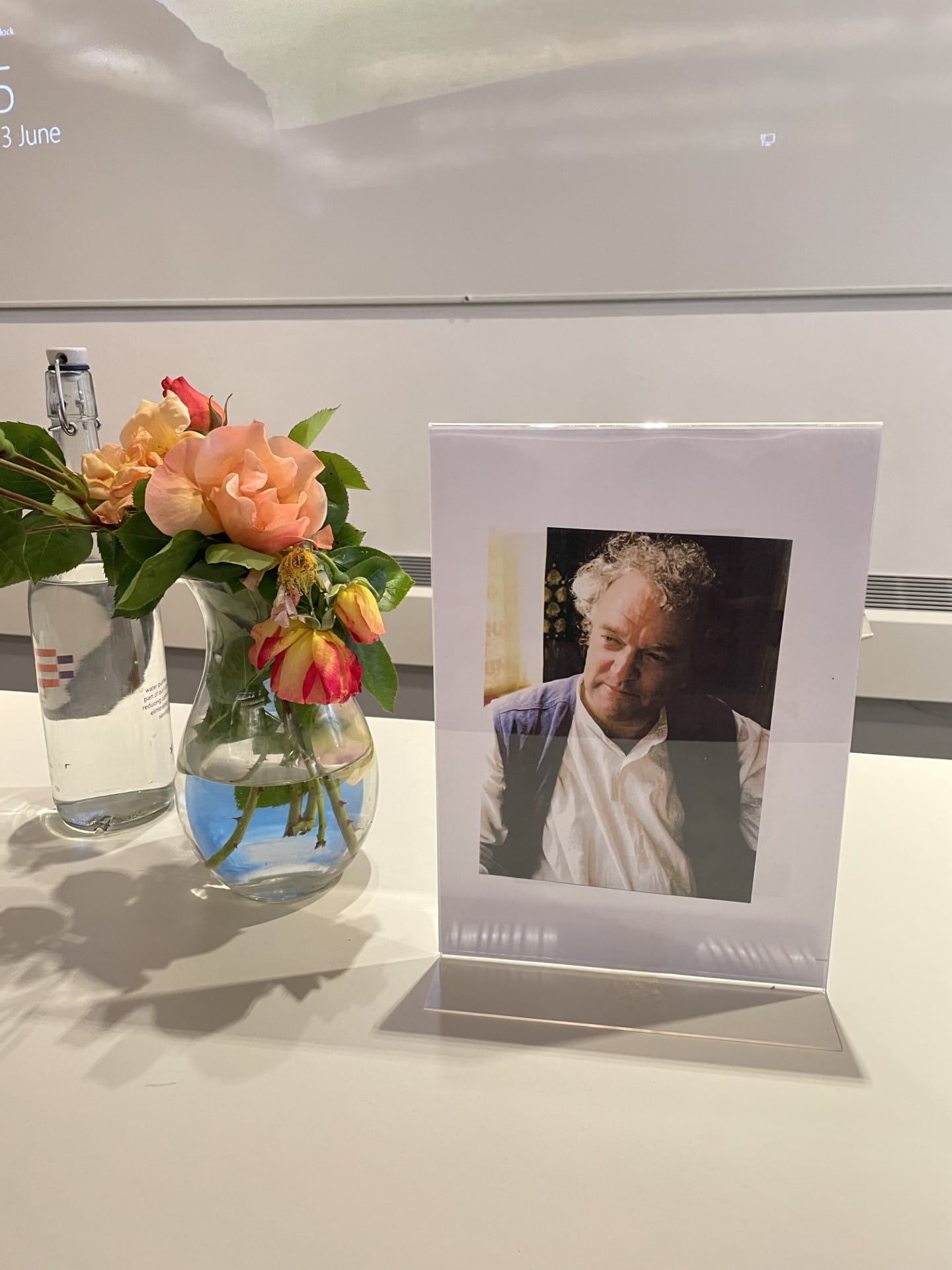
Róisín Ryan-Flood, Neli Demireva, Eamonn Carrabine, Nigel South, Agnes Skamballis and EJ Caris-Hamer, organised a remembrance conference for the late Ken Plummer that was held on June 3rd.
There was an international lineup of speakers including Arlene Stein, Paul Rock and Sasha Roseneil.
The event included the presentation of the BSA Lifetime Achievement Award, which was given to Ken posthumously.
Ken was a longstanding member of the department prior to his retirement. He was a renowned international scholar who transformed British Sociology. His achievements were wide ranging and he was particularly noted in the field of sexualities and intimacy.
The conference was a very special day and a fitting tribute to Ken’s life and work.
Agnes Skamballis

It is with a very heavy heart that I am writing about the loss of dear Agnes Skamballis, who was a longstanding member of the professional services staff in the department.
She was the administrator for the journal Sexualities: Studies in Culture and Society founded by Ken Plummer since its inception and continued with the current editorial team.
Over the years, many have remarked on how she handled her role at the journal with great sensitivity, tact and warmth and made contributors’ experiences of the journal such a positive one.
Everyone felt well cared for by Agnes, as well as noting how incredibly good she was at her job. In addition to being a brilliant colleague and fantastic human being, she was a personal friend to many in the department and will be much missed.
Research Excellence Awards
The department scooped three top places at the university-wide Research Excellence awards this term. Many congratulations to
- Boroka Bo (Best Research Impact by an ECR, Social Sciences) for her Essex oyster project
- Kat Hadjimatheou (Best UK Public Policy Impact) for her work on disclosure schemes
- Phoebe Kisubi Mbasalaki (Best Creative and Cultural Impact) for her theatrical production co-created with Mary Mazzilli (LiFTS)
and to those who were nominated in other categories.
Our Research Students
Norman Riley
Congratulations to Norman Riley for winning the 3 Minute Thesis Competition with his presentation, "A Working Class Vegan is Something to Be".
Three Minute Thesis - A Working Class Vegan is Something to Be? from University of Essex on Vimeo.
Norman has been hard at work with a number of events.
I delivered a few talks this month which has been exhausting and exhilarating in equal measure. At the Essex Sociology PGR conference, I presented Hearing pain: Secondary trauma and countertransference in research. This was followed less than 24 hours later by my presentation A working-class (vegan) hero is something to be at the Three-Minute Thesis competition where, completely unexpectedly, I won! On Monday May 22nd, I spoke at the Pint of Science event held at Two Brews in Colchester. I was asked to discuss my paper, PC-ravaged clowns or plant-powered pioneers as part of the Right Here, Right Now panel. During the first two weeks of June I presented Choose life: 'The liberatory potential of political veganism' at the Vegan Sociology colloquium organised by my colleague Kerry Preston and I, 'A working-class vegan hero is something to be? Perceptions of veganism' in my hometown at Edge Hill University's Centre for Human Animal Studies' Conference, and finally at Oxford University's Race and Resistance Programme where I gave a talk titled Veganism for Consistent Pro-Liberation.
Sanjaya Aryal
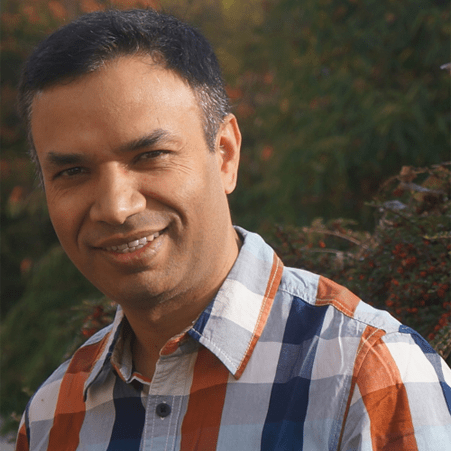
Sanjaya has published the first article from his PhD research jointly with his supervisor Ayse Guveli in the Journal of Family Studies: ‘Flying families between the UK and Nepal: compromised intergenerational care amidst a restrictive migration policy context’.
Based on the study of Nepali care workers in the UK and their family members, this article explores on the implications of migration policies in maintaining informal intergenerational care among transnational families of care workers in the global South to the North migration context. This study generates novel data on the care practices within Nepali families and compare Nepali Gurkha and non-Gurkha families to illustrate the role of migration policies in exacerbating or reducing care inequalities. The research reveals how these inequalities force migrants to become ‘flying families’ to maintain care in proximity through cross-border mobility where grandparents appeared as active agents in maintaining intergenerational care. It proposes a policy recommendation to enable the mobility of extended families and extend welfare provisions to reduce care inequalities created through the supply and recruitment of the care workforce from the global South to the global North.
Aryal, S. and Guveli, A., (2023). Flying families between the UK and Nepal: compromised intergenerational care amidst a restrictive migration policy context. Journal of Family Studies.
EJ Caris-Hamer
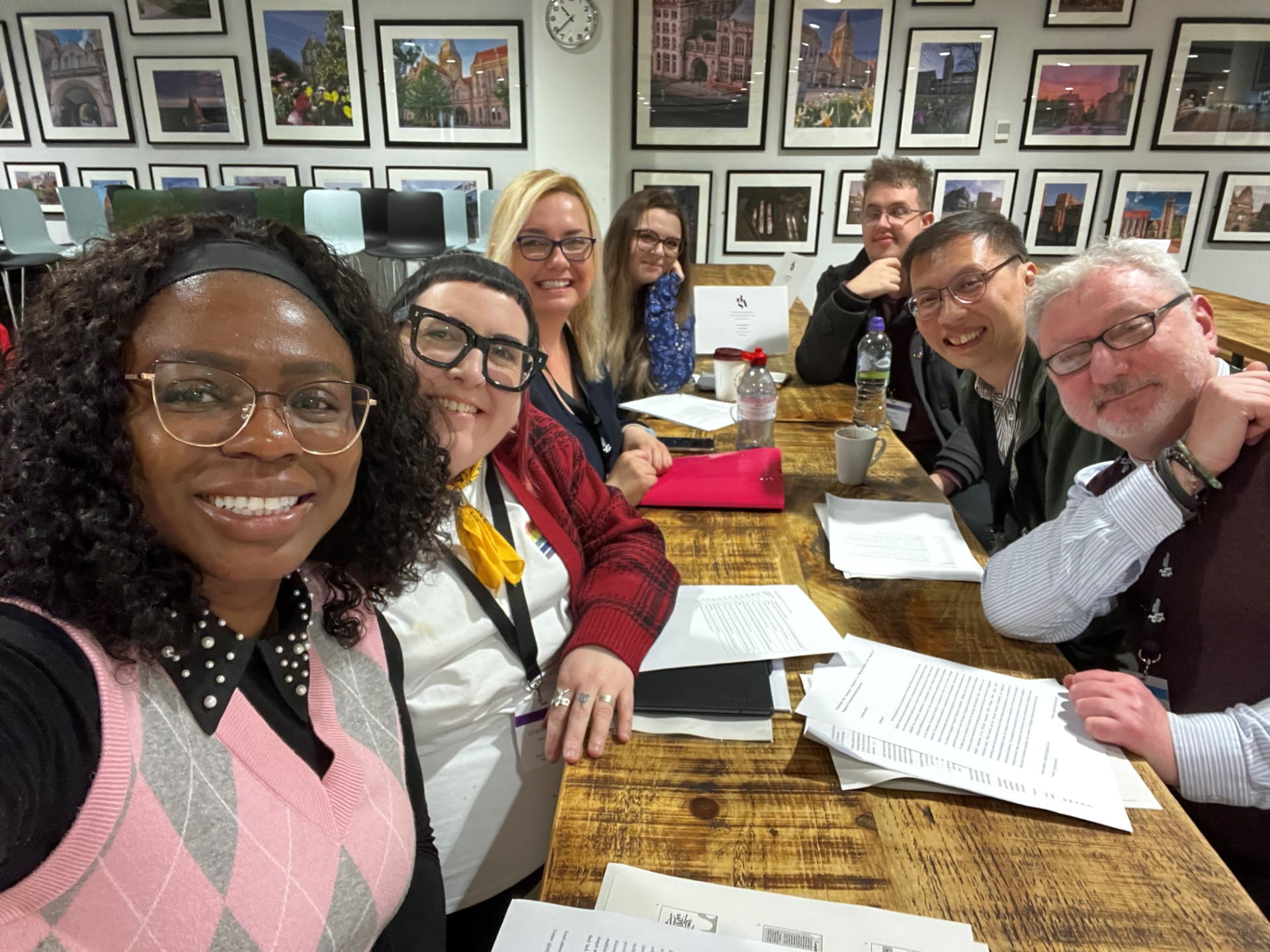
EJ has presented at the SLSA, and BSA conferences and in June presented at the ‘Outsiders’ conference at The University of Brighton. These presentations discuss the theme based upon zir upcoming second published work ‘What’s in a Name (or even Pronoun)?’ chapter in an edited book addressing Consent. The chapter considers the often complex navigation teachers face regarding who should consent to the social transitioning of pronouns and names.
Ze has also received their second nomination for the Education Excellence Award. Furthermore, ze is part of a research project evaluating consent training at The university of Essex alongside Dr Laurie James Hawkins and Dr Veronica Lamarche.
Aruna Mahananda

My article Emergence of Dalit Bahujan Students Movement: A Study of University Campuses in Western Odisha was accepted by Contemporary Voice of Dalit: Sage Journals. The online document will soon be released, and the final online publication is anticipated to be finished by the middle of August 2023.
The study clearly demonstrated the challenges faced and measures carried out by the Dalit Bahujan student movement on university campuses. Finally, it presented a thorough explanation of the various factors that led the Dalit Bahujan students to join the movement and encouraged them in understanding their personal responsibility to ensure that this tradition is handed on to future generations.
Chris Cunningham
Christopher Cunningham is continuing to make good headway with his PhD alongside navigating the complexities of the labour market and the commitments of parenthood.
In June he will presented a paper 'Adult Learners as Intellectual Activists' at the UALL/SCUTREA 2023 Conference at Madingley Hall, Cambridge University.
In July, working in partnership with his colleagues from the Essex Business School and representatives from a local housing association, Chris is delivering a seminar titled 'Community Entrepreneurship: Levelling Up through Local Community Empowerment' to the Chief Scientific Advisor of the Department of Levelling Up, Housing and Communities (DLUHC).
Total Liberation - the case for Vegan Sociology
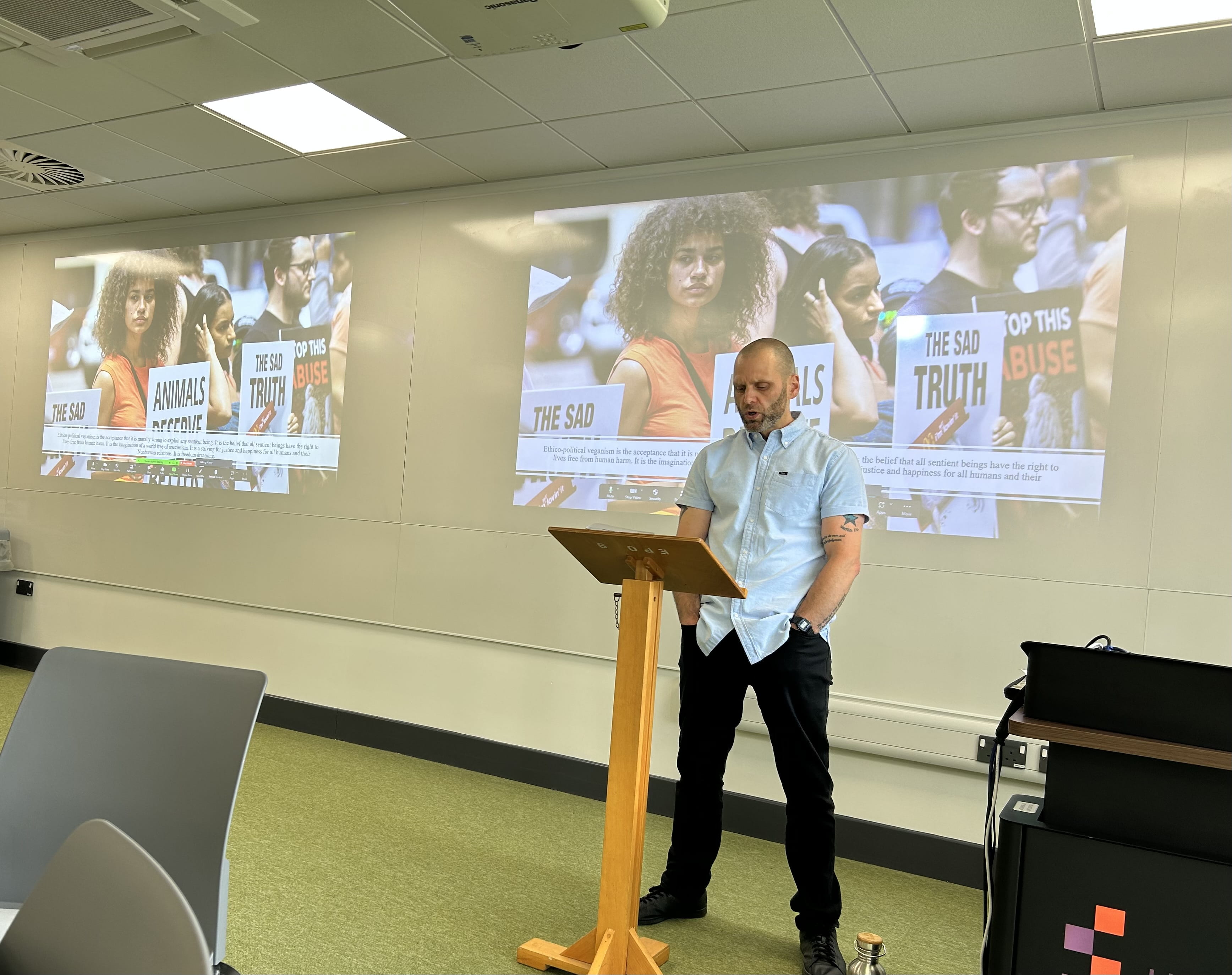
Thanks to Dr Katy Wheeler's hard work in securing funding for the event, PhD students Norman Riley and Kerry Preston organised a hybrid Sociology colloquium called 'Total Liberation - the case for vegan sociology' on June 1st.
The colloquium was a huge success and featured four thought-provoking and powerful talks from academics at the forefront of veganizing sociology: Dr Corey Lee Wrenn, Dr Matthew Cole, Alexandra Kimbo, Norman Riley, and Dr Kate Stewart.
Feedback from the day was excellent, the vegan lunch was thoroughly enjoyed, and discussions were riveting. In encouraging research students to put on such a colloquium, the Department has reinforced its reputation as a place of radical and groundbreaking sociological inquiry.
Our Academic Staff
Professor Róisín Ryan-Flood
Laurie, Isabel and I have a new book out:
Difficult conversations: a feminist dialogue. London: Routledge Ryan-Flood, R., Crowhurst, I., & James-Hawkins, L. (Eds.). (2023).
Focusing on intersectionality within feminist theory, the book critically addresses questions of power and difference as a central feminist concern. It presents ethical, political, social, and emotional dilemmas while negotiating difficult conversations, particularly in terms of sexuality, class, ‘race’, ethnicity and cross-identification between the researcher and researched. Topics covered include challenging cultural relativism; queer marginalisation; research and affect; and feminism and the digital realm.
We held a special event for this at the BSA conference in Manchester in April, where several contributors presented their book chapters (pictured).
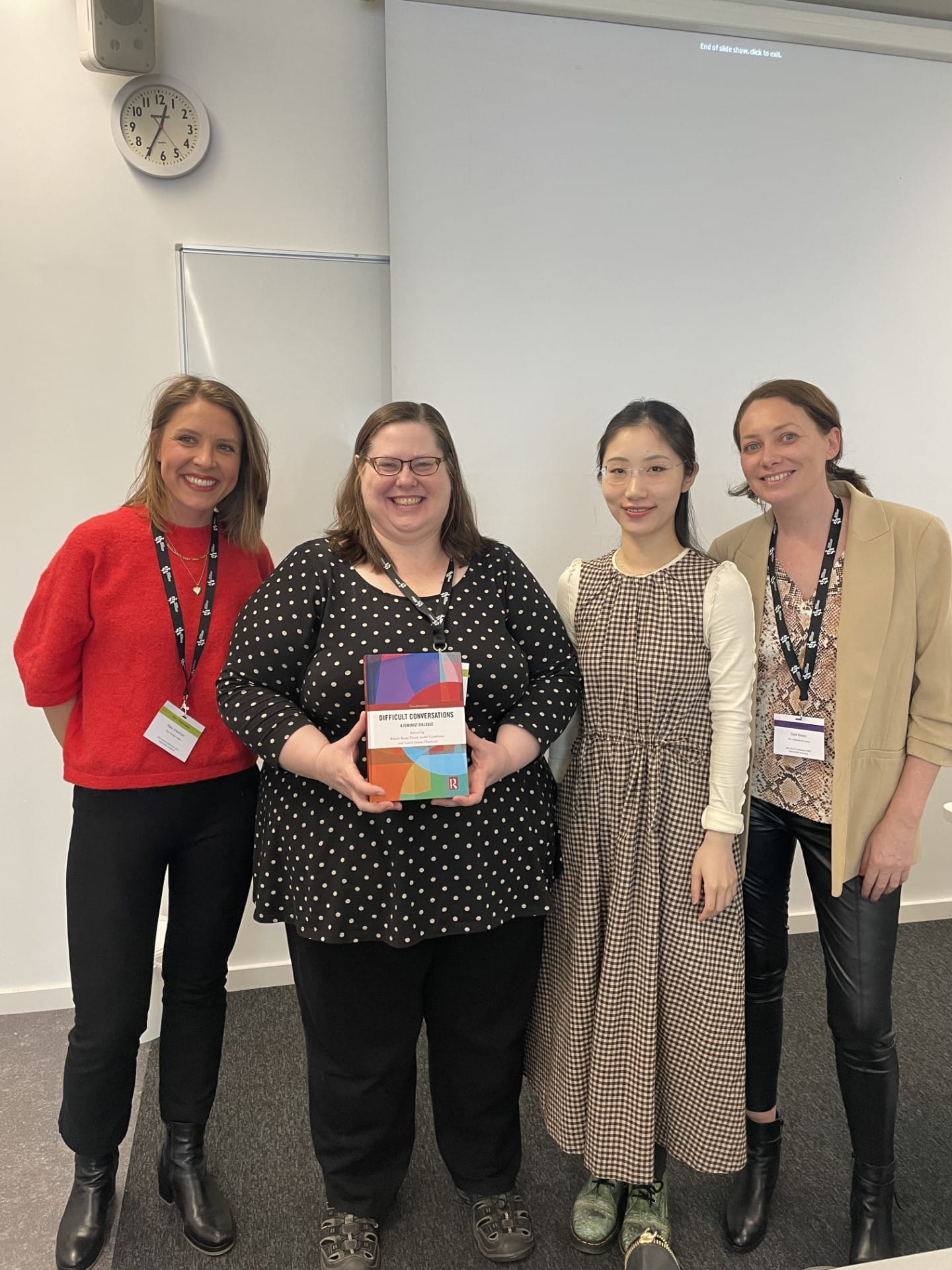
I also have a new publication from our British Academy funded project with colleagues from PPS:
Rohleder, P., Ryan-Flood, R., & Walsh, J. (2023). Holding hands: LGBTQ people’s experiences of public displays of affection with their partner(s). Psychology & Sexuality, 1-13.
Dr Phoebe Kisubi Mbasalaki
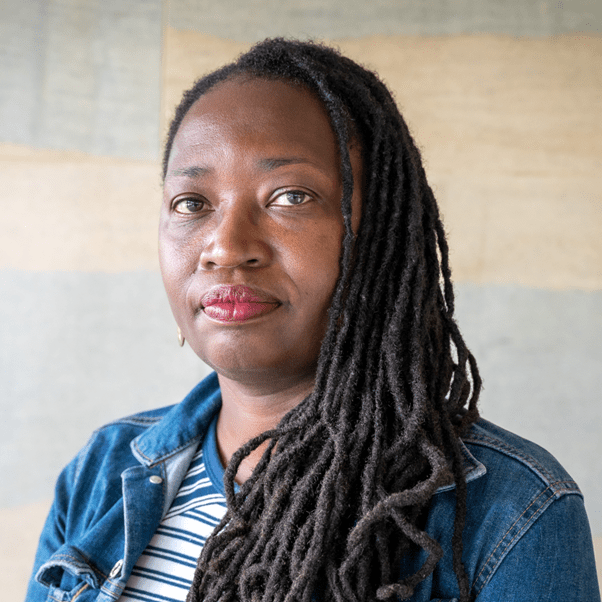
Phoebe has secured QR IF-funding for her collaborative project with Mary Mazzilli (LiFTS) on 'Economies of care: locating migrant health care workers in the UK in times of crisis'.
Dr Sobia Ahmad Kaker
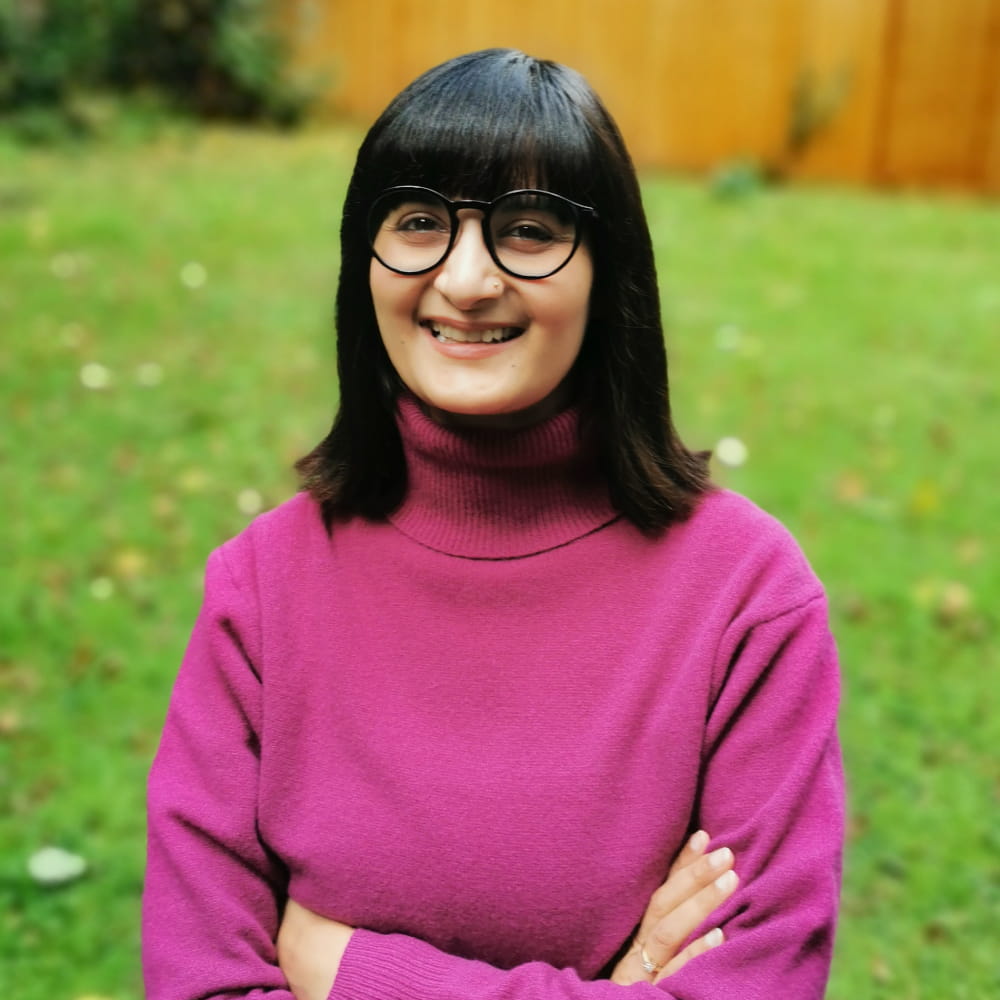
I am looking forward to couple of outreach and engagement activities over the summer.
Firstly, I've been invited to record a podcast on Displacement Urbanism A podcast series by Dr Romola Sanya, London School of Economics. We are recording this podcast on 23rd June, 2023. I will be talking about criminalisation of working-class urban residents and processes of displacement in Islamabad. This discussion will draw on my recently completed GCRF project titled 'Uncertainty & Insecurity of Tenure: Developing Infrastructures of Care & Resistance' (in collaboration with the Alliance for Urban Rights, Pakistan).
Secondly, I'm co-organising a panel on 'Urban Transformations and Plural Policing in Southern Contexts' at the 23rd Annual Conference of the European Society of Criminology (Florence, 6-9 September 2023). The panel is organised with my friend and colleague Dr. Zoha Waseem, who is based at the University of Warwick. It brings together academics from across disciplines (geography, sociology and criminology) who look at private, public, community and digital policing in african and asian contexts.
And finally, I will also be participating at the Urban Violence Roundtable at the he 23rd Annual Conference of the European Society of Criminology (Florence, 6-9 September 2023). I'm looking forward to an engaging conference!
Professor Mike Roper
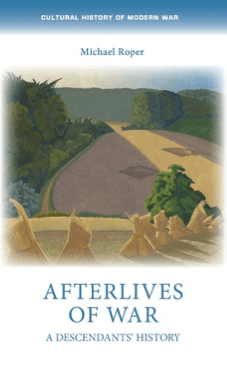
My book Afterlives of War. A Descendants’ History was published by Manchester on 27th June. It will be available in hardback and free digital form, which I’m delighted about as the book will be accessible to all. From the blurb:
"Afterlives of War is a study of the generations in Britain, Germany and Australia who were born after the First World War and lived in its shadow. These people experienced the effects of the global cataclysm in their homes as young children before they ever knew the conflict as History. Yet because they were not direct witnesses, and their testimonies were ‘second hand’, the war’s impact on them was often hidden.
"Drawing on ninety interviews, observation of the First World War Centenary, and research on the First World War history in the author’s own family, this book documents the inter-generational legacies of the conflict and the rich historical culture that descendants create."
Igave a paper based on the book at the Historical Imagination conference at Essex on 17th June, talked at a roundtable on family history at the Institute of Historical Research on 21st June, and am attending the Social History society conference in July.
Professor Michael Halewood
 Michael will be giving a plenary lecture at the 13th International Whitehead Conference to be held in Munich from July 26th to 29th. The title of the talk is: 'A Question of Character? Some Thoughts on the Extensive Continuum'.
Michael will be giving a plenary lecture at the 13th International Whitehead Conference to be held in Munich from July 26th to 29th. The title of the talk is: 'A Question of Character? Some Thoughts on the Extensive Continuum'.
Dr Sarah Kunz
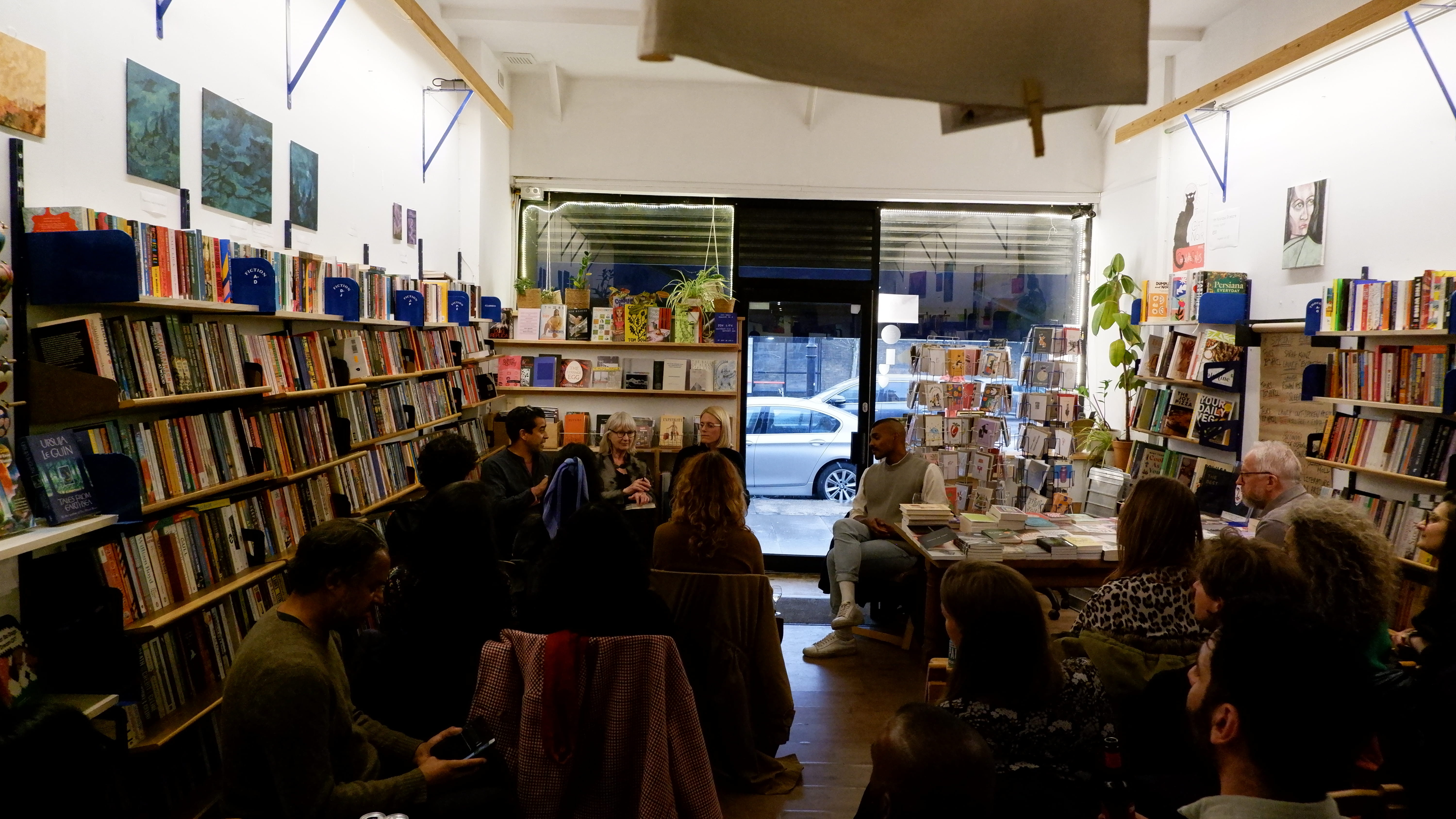
I had a book launch for my book Expatriate: Following a Migration Category on 27 April (thank you again to the colleagues who came along!), and have since given talks about the book at the IOE and the LSE (as part of our BSA Sociology of Elites Study Group event), and online at the University Münster and for the Privileged Mobilities IMISCOE Network.
I had a paper published in April. It's titled 'Invisible no more: women’s work in the oil and gas industry' and was published in the Journal of Energy History, as part of a special issue on labor, social relations and industrial culture in the history of the oil and gas industry.
The paper challenges imaginations of the oil and gas industry as a prototypical ‘men’s world’, to highlight the multifaceted if often invisible work women have performed to enable but also challenge the industry, in roles such as graduates, housewives, and domestic workers.
The paper argues that 1) women’s work as much as its relegation to the private sphere and positioning as lesser or not work are constitutive of the industry; 2) women never constituted a homogeneous group, as intersecting inequalities of class, nationality, and racialisation further shaped their positioning and often-ambivalent relationship with the corporation; 3) not only labour regimes in the oil industry but also its archive are deeply gendered, necessitating the opening up of corporate archives, as well as methodological plurality.
Professor Pam Cox
Pam Cox is looking forward to the publication this summer of her new co-authored OUP/Clarendon book, Victims and Criminal Justice: A History, co-authored in monograph format with Bob Shoemaker (Sheffield) and Heather Shore (Manchester Met). It’s the first work of its kind to trace the history of complainants in the English justice system over three centuries.
The book, together with underpinning datasets now deposited in the UKDA, are outputs from her ESRC grant on Victims’ Access to Justice. More contemporary findings from the project have shaped Pam’s submission – made jointly with Ruth Lamont (Manchester) – to the Justice Select Committee and to amendments to the Victims and Prisoners Bill.
Pam will complete her three year tenure as Head of Department on 31 July and will spend her sabbatical year writing a new short book for Polity entitled What is Social History?
Outside UoE, Pam continues to campaign to become Colchester’s first Labour MP since 1945 and its first ever woman MP. Volunteers welcome!
Dr Kat Hadjimatheou
Kat has landed a prestigious British Academy Mid-Career Fellowship for 2023-24 to study the conflict between the rights of convicted criminals to privacy and the need for the public to understand potential risks and to see justice served.
Dr Hadjimatheou said: “In today’s increasingly technologically-driven and risk-assessed world, someone with a criminal record can expect their conviction to be more visible and for longer than ever before. Trends towards ever-greater exposure are changing individual experiences of criminalisation and raising the stakes of long-standing questions about the role of publicity in criminal justice.
Professor Neli Demireva
16th of June, 2023, Closing Keynote: 'What are the main factors preventing foreign workers from getting good jobs and how can they be addressed?' International Workshop on Refugees’ Employment and Integration: Challenges of and opportunities for the employment of refugees in late industrialising countries, Loughborough University
Professor Sean Nixon
In May, Sean wrote a blog 'Mothering birds', for the site Winged Geographies.
Dr. Laurie James-Hawkins
I just published an article in the Journal of Sex Research: 'I Just Wasn’t Thinking”: Strategic Ambiguity and Women’s Accounts of Unprotected Sex' Laurie James-Hawkins & Kristen N. Jozkowski
Heterosexual university students continue to endorse sexual scripts that preference men’s desire and sustain gendered power imbalances in sexual relationships and encounters, leading women to risk pregnancy by engaging in unprotected sex. Because young women also endorse norms encouraging them to protect themselves and their partners from unintended pregnancy, women are caught in a bind between two often competing norms. We conducted semi-structured individual interviews with university women (n = 45) to examine how they navigate these competing norms.
Our findings suggest that women were actually thinking about risks and making calculated decisions in the moment which often privileged men, putting themselves at risk and sometimes causing distress. To save face, women presented the idea that they “just weren’t thinking” in different ways that conformed to traditional notions of romance and sexuality.
Prof. Sandya Hewamanne
My book Restitching Identities in Rural Sri Lanka won the Cecil B. Currey award for the best book in global south studies. This is among books published during 2019-2021.I wrote about the research process in this blog.
I have been elected the vice president of the American Institute for Sri Lanka Studies. This is for a three year term.
I am also quite thrilled to co-author two book chapters with two of my Essex colleagues, Rosin Ryan Flood and Nigel South, this year:
'Feminism and race in academia: An interview with Sandya Hewamanne'. Difficult Conversations: A Feminist Dialogue, eds,. R. Ryan-Flood, I. Crowhurst, and L. James-Hawkins. London: Routledge (Co-authored with Rosin Ryan Floyd).
'Women and the structural violence of ‘fast-fashion’ global production: victimization, poorcide and environmental harms'. Gendering Green Criminology, eds., Milne, Emma. Pamela Davies, James Heydon, Kay Peggs, and Tanya Wyatt. Bristol University Press. (Co-authored with Nigel South)
Dr. Tara Mahfoud
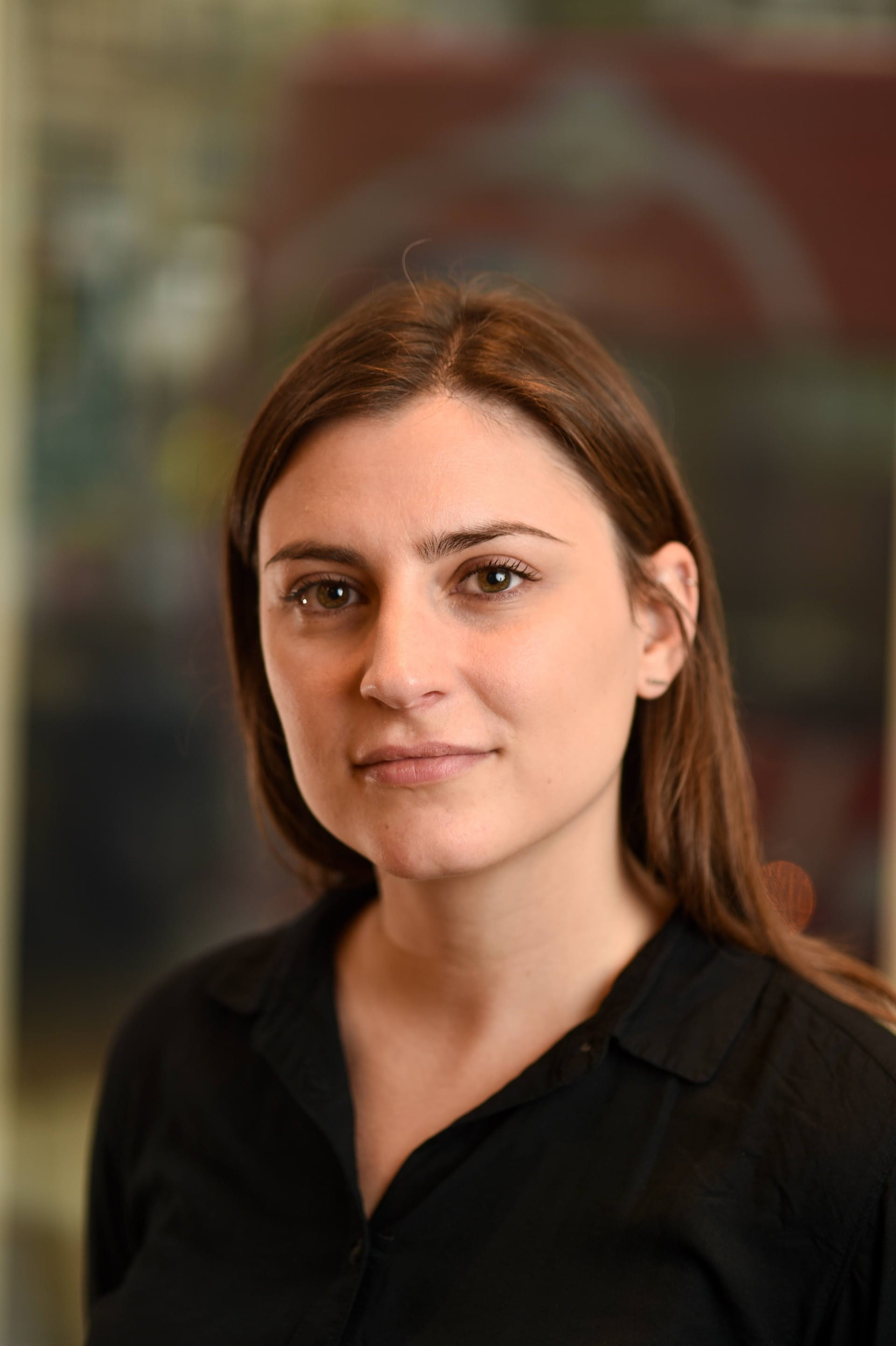
In March, I attended the final Human Brain Project summit in Marseille, France where I presented a poster on some of my recent research with Christine Aicardi (King’s College London) titled 'Formal and Informal Infrastructures of Collaboration in the Human Brain Project'. I was also invited to attend a meeting on enhancing diversity, gender equality, and inclusion in science. I also used the opportunity to conduct interviews and do participant observation as the final stages of data collection for my book on the Human Brain Project.
I was invited to write a chapter for the Research Handbook on the Sociology of Science and Technology (Edward Elgar), edited by Sandra P. González-Santos (Anahuac University, Mexico City), Hauke Riesch (Brunel University London), and Neil Stephens (University of Birmingham). The chapter is titled 'Engagements between the social sciences, humanities and neurosciences' and is co-authored with Philipp Haueis (Bielefeld University) and Sam McLean (King’s College London). We submitted the manuscript in June and it is now under review.
I am co-organising three events this year:
- For the Annual Conference of the British Society for the Philosophy of Science (Bristol, 5-7 July 2023), I am co-organising a symposium on “Large Scale Brain Models, From Technology to Biology” with Rosa Cao (Stanford University) and Mazviita Chirimuuta (University of Edinburgh). The symposium will explore the tight relationship between technology and biology in today’s research environment which forces us to consider how boundaries are being drawn between the natural and the artificial, and whether scientists accept or deny an ontological division between organs/organisms and machines. The aim of this symposium is to demonstrate how philosophy of science and STS can learn from each other.
- For the Annual Meeting of the Society for Social Studies of Science (Honolulu, 8-11 November 2023) I am co-organising a panel titled “Studying with: building infrastructures for collaborative work” with Koichi Mikami (Keio University); Jane Calvert, Emma Frow, Robert Smith (University of Edinburgh) and Erika Szymanski (Colorado State University). For this panel, we are interested in a ‘third mode’ of engagement between social scientists and scientists and engineers - neither distantly observing nor actively trying to change scientists and engineers or their research but studying with them. We want to engage and grapple with the affective work, opportunities and challenges that practicing this mode of STS entails. We have accepted 18 paper submissions.
- At the University of Essex (7-8 December 2023), I am co-organising a workshop titled “Re: Constructs | Exchanges between STS and Sociology” with Noortje Marres (University of Warwick) and Michael Guggeinheim (Goldsmiths University) funded by the Department of Sociology at Essex and the Centre for Interdisciplinary Methodologies at the University of Warwick and organised in collaboration with the British Sociological Association's STS study group. The overall aim of this workshop is to investigate how key concepts have been developed through exchanges between STS and Sociology during the last 40 years or so. We will have a total of 14 speakers, including our own Linsey McGoey and Anne Pollock, Professor of Global Health and Social Medicine at King's College London and President-Elect of the Society for Social Studies of Science (4S).
Professor Anna Sergi
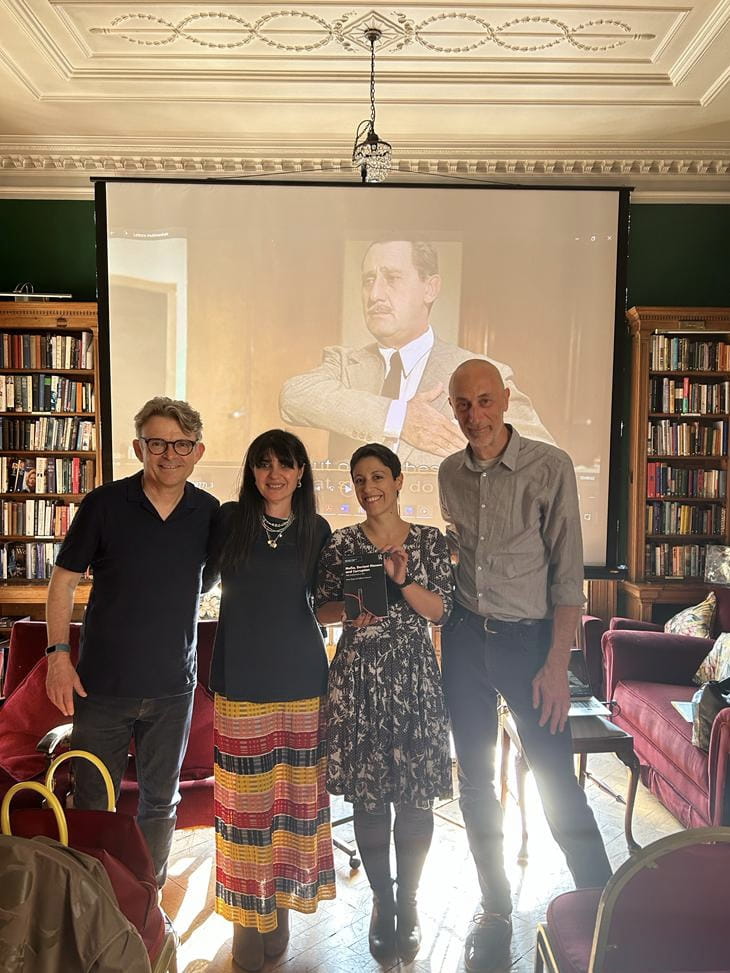
Professor Anna Sergi’s new book, co-authored with Prof Alberto Vannucci, titled Mafia, Deviant Masons and Corruption: Shifty Brotherhoods in Italy was published by Routledge in May 2023. Prof Sergi and Prof Vannucci presented the book at the University Women's Club in Mayfair, London on the 5th of June in an event sponsored by the University of Essex, under the Rapid Response Fund for Impact and Engagement Activities and also partially by King’s College Centre for Italian Politics. Some pictures of the event attached with Essex colleagues and with the authors plus the speakers, Prof Leila Simona Talani and Prof John Dickie.
From the same research, Prof Sergi and Prof Vannucci have also published an article in Deviant Behaviour, open access, titled 'Protection and Obedience. Deviant Masonry, Corruption, and Mafia in Italy'.
Prof Sergi has also co-hosted her first podcast - in Italian - called Le Onorate (The Honourable Ones) with award winning journalist Stefano Nazzi, for Il Post, an Italian news outlet. Le Onorate, about women and the ’ndrangheta, Calabrian mafia, aired in three episodes in April and was the top ’Society’ podcast in Italy for two weeks!
In April Prof Sergi was in Australia for fieldwork and research development. She was hosted by the Australian National University in Canberra and also visited Deakin University in Melbourne.
In May 2023, Prof Sergi was invited to speak at a roundtable in a conference of violence and mafias organised by the University of Pisa, on the 30th anniversary of mafia-led attacks in Florence. Prof Sergi has also been invited to act as keynote speaker to the Illicit Trade Summer School organised by the University of Groningen and the University of Catania in Sicily in early July 2023.
In June, Prof Sergi was interviewed on the Shattered Lives podcast.
Professor Nigel South
 In April I presented a Keynote at John Jay College, New York at a conference on ‘Decolonising Criminology’; and in May, gave a plenary at the Utrecht University ‘Green Crimes and Eco-Justice’ conference.
In April I presented a Keynote at John Jay College, New York at a conference on ‘Decolonising Criminology’; and in May, gave a plenary at the Utrecht University ‘Green Crimes and Eco-Justice’ conference.
Both papers were partly drawing on a recent article in Sociological Review – ''An incorporeal disease': COVID-19, social trauma and health injustice in four Colombian Indigenous communities’.
Professor Pete Fussey
Appeared on the front page of The Guardian discussing Met Police uses of advanced surveillance during the Coronation.
Recent research also featured in The Guardian, FT and other national media.
Lead author on a report examining the Data Protection and Digital Information Bill focusing on the depletion of surveillance oversight. We also managed to corroborate and document unpublicised Ministerial plans to embed powerful AI-driven surveillance across UK policing despite the absence of a clear legal basis. The report was submitted by the UK Biometrics and Surveillance Commissioner to the House of Commons Bill Review Committee. The report gained national media coverage and was used by the SNP to table an amendment aimed at embedding human rights protections into police surveillance practices (Hansard).
Journal paper accepted on surveillance chilling effects among human rights defenders in Uganda.
Finished amendments and proofing etc. on a chapter on surveillance and smart cities for the forthcoming Oxford Handbook of Criminology (out in June).
Participated in a meeting at the House of Commons on AI-driven surveillance with members of both chambers.
Spoke on a Europol panel at CPDP in Brussels on the human rights implications of AI in policing and security after Brexit.
Spoke at a Royal Holloway public event on AI regulation.
Contributed to the submission of two UKRI proposals on AI aimed at developing significant research infrastructure around the topic.
I’ve also been organising a Doctoral Training School for surveillance studies students, with 28 delegates from around the world attending Essex 19-23 June.

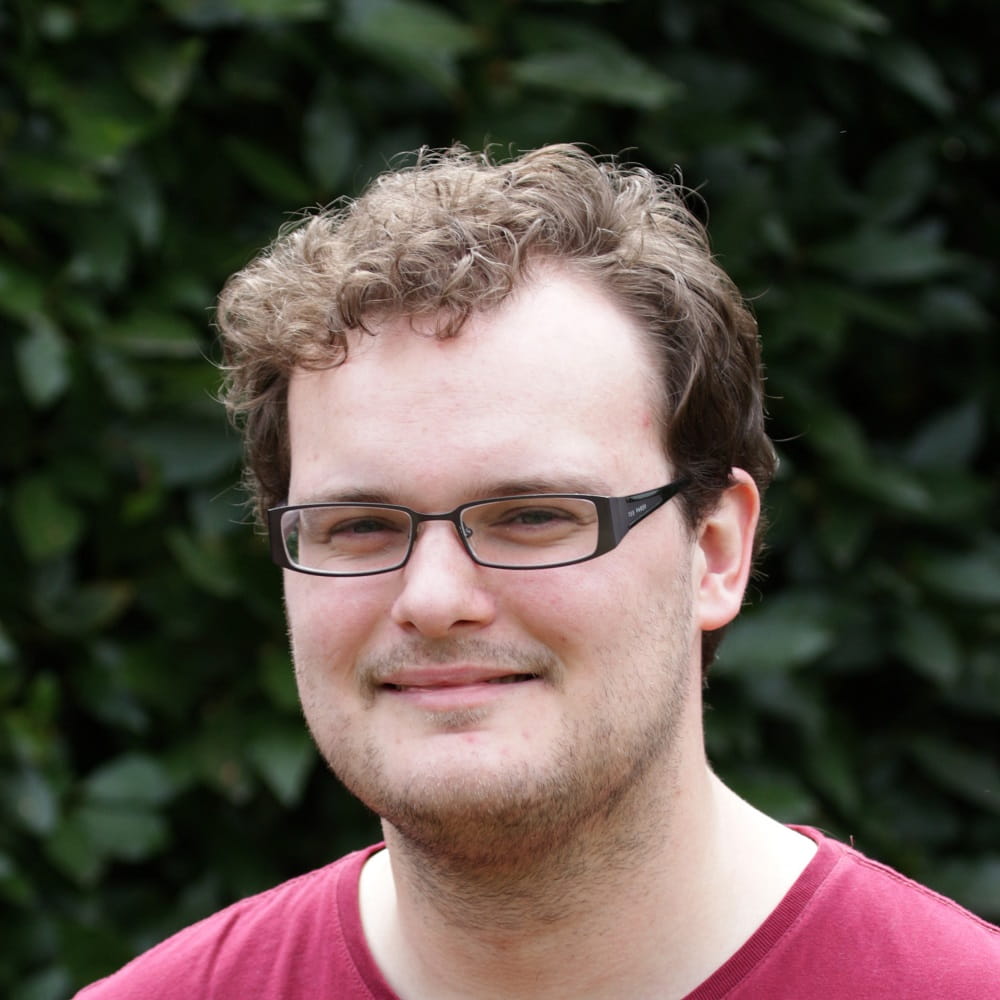










 Michael will be giving a plenary lecture at the 13th International Whitehead Conference to be held in Munich from July 26th to 29th. The title of the talk is: 'A Question of Character? Some Thoughts on the Extensive Continuum'.
Michael will be giving a plenary lecture at the 13th International Whitehead Conference to be held in Munich from July 26th to 29th. The title of the talk is: 'A Question of Character? Some Thoughts on the Extensive Continuum'.


 In April I presented a Keynote at John Jay College, New York at a conference on ‘Decolonising Criminology’; and in May, gave a plenary at the Utrecht University ‘
In April I presented a Keynote at John Jay College, New York at a conference on ‘Decolonising Criminology’; and in May, gave a plenary at the Utrecht University ‘